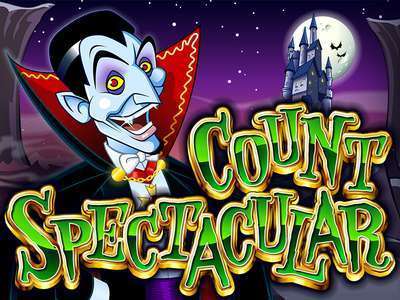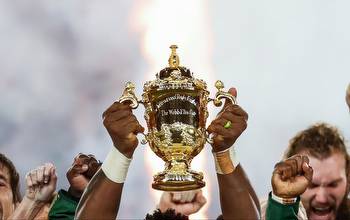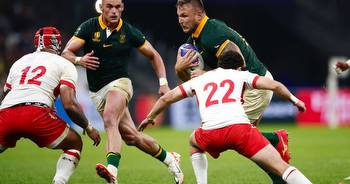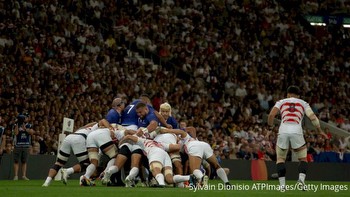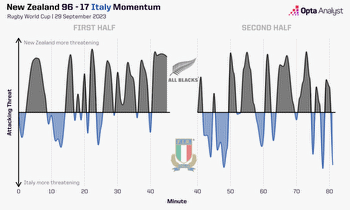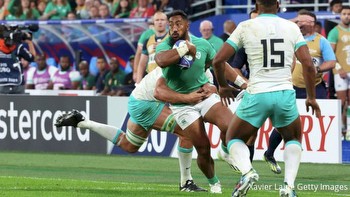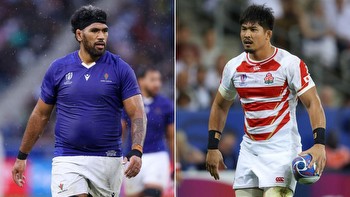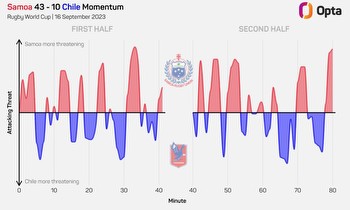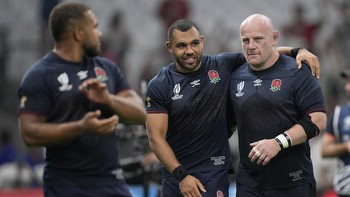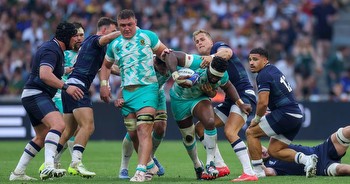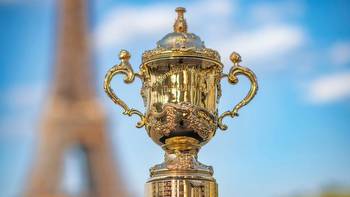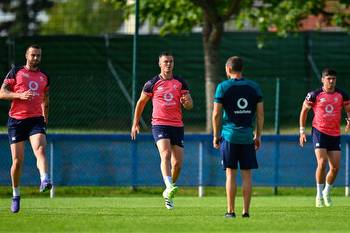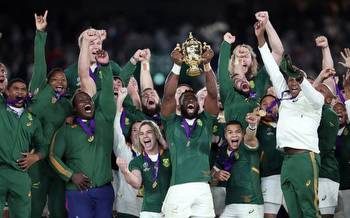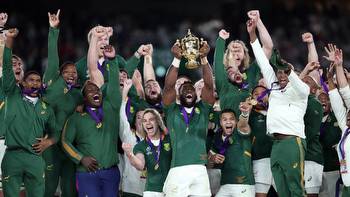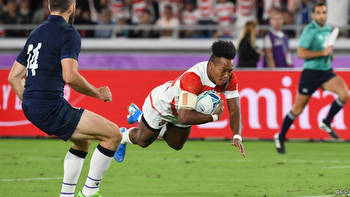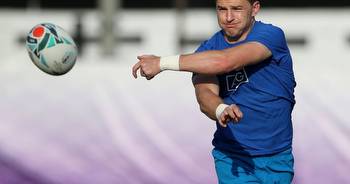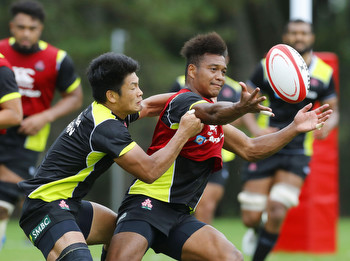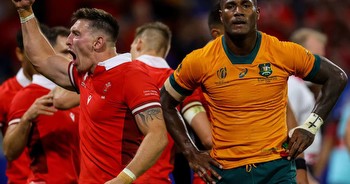Rugby World Cup Data Roundup: Round 4
Stats, talking points, data visualisation and predictions. That’s what you can expect from our weekly Rugby World Cup data recap. Time to dig into Round 4.
Round 4 of the 2023 Rugby World Cup marked the end of the road for Namibia, Chile and probably Australia at this edition of the tournament. There was a mixture of closely fought classics and one-sided washouts to enjoy, all wrapped up by a slugfest between South Africa and Tonga on Sunday night. We dive deep into the data behind three of those fixtures but give insights into every match over the last week, as well as an update on our tournament predictor.
After impressing against both France and Italy, it seemed like Uruguay were going to lose all the positivity they earned from their performances in this year’s Rugby World Cup, as Namibia raced into a 14-0 lead early on and held a 23-12 lead three minutes into the second half. However, the turning point came when Aranos Coetzee was yellow carded for the Welwitschias. At that point in the match the Opta win predictor gave Uruguay a 31% chance of winning the fixture, their lowest rate at any point in the game. However, within minutes Los Teros had made the most of their one-man advantage, crossing for two converted tries as their win probability shot up to 86%.
Uruguay’s Felipe Etcheverry continued a fine run of form in the tournament, assisting two tries to take his total to five for the tournament, the joint most of any player alongside Garry Ringrose and Cam Roigard. In fact, he’s assisted 56% of Uruguay’s tries in the World Cup this year – no other player has assisted at least half of their team’s tries.
Japan and Samoa went into their Pool D clash knowing only a win would keep their Rugby World Cup hopes alive. It was the Brave Blossoms who came out of the blocks quickest in Toulouse on Thursday evening. Japan scored the opening two tries of the game to lead 17-3 after 35 minutes and despite conceding a try just before halftime, always looked in control.
Japan were more efficient than Samoa in several areas of the game – they made just 87 carries to Samoa’s 145 but gained almost as many metres, recording an average gain of 4.9 metres per carry and restricting Samoa to 3m per carry – only Romania and Tonga had lower rates over the weekend.
The Brave Blossoms also made six line breaks to Samoa’s two and, most importantly, were able to make them count. Two of their three tries came after a break while none of Samoa’s tries had a line break involved in the buildup. That resulted in Japan averaging 2.4 points per 22 entry, not an exceptionally high number but comfortably better than that of Samoa (1.9).
The Samoans meanwhile will be disappointed by their attacking performance which was stifled as a result of conceding twice as many turnovers as Japan (14-7) including three times as many handling errors (12-4).
Japan now have a straight shootout with Argentina next weekend to reach the quarter-final. Their win was reflected in Opta’s tournament predictions, which gave the Brave Blossoms just a 17% chance of reaching the knockouts this time last week but now estimates those chances at 26%. They are still very much the underdogs but it’s a tag that Japan have thrived under over the last few World Cups.
It wasn’t quite a record result – although only the All Blacks have beaten Italy by more at a Rugby World Cup (101-3 in 1999) – but there were a few records made during New Zealand’s hammering of the Azzurri on Friday night. Sam Whitelock came off the bench to earn his 149th Test cap, becoming the most capped All Black of all-time and second-most capped man ever in Test rugby (Alun Wyn Jones– 170), while Dane Coles crossed for a couple of tries, becoming the oldest All Black to score a try at the men’s Rugby World Cup.
Ian Foster had some interesting comments post-game, comparing the ball in play time of this match to that of South Africa vs. Ireland, to which Rassie Erasmus responded on X (of course), with screenshots of Opta reports no less.
Foster suggested that New Zealand’s win against Italy was a ‘different spectacle’ to the stop-start nature of the ‘Boks defeat to Ireland. If he was so keen on ball in play time he could have told his All Blacks side not to score so often – 21 minutes and 20 seconds of potential game time were lost as a result of New Zealand scoring every few minutes…
The first ever all-South American clash at the Rugby World Cup ended in a comfortable win for the Pumas. It was their second biggest win at the Rugby World Cup, after a 63-3 victory against Namibia in 2007. Nicolás Sánchez won his 100th cap, crossed for a try and ended the game with 20 points to become Argentina’s top scorer in Rugby World Cup history. Not a bad day at the office.
Heading into the tournament, this match always looked like it would be a close one, and so it panned out. Fiji’s strong form had seen them sit at 85% for winning the game pre-match but that plummeted as Georgia took a 9-0 half-time lead, leaving things 50:50 according to the Opta predictor.
In the end, Georgia couldn’t turn their pressure into anything more than four penalties and they have just one chance left for a victory against Wales. If they don’t beat the Welsh (as they did in 2022), then it would be the first time since their inaugural participation (2003) that they’ve failed to pick up at least one win in a Rugby World Cup campaign.
Scotland rung the changes for this match but it made little difference as they ran amok in Lille, notching up their second largest Rugby World Cup win (after 89-0 vs Ivory Coast, 1995).
Darcy Graham was unstoppable, crossing for four ties, a total that has only been matched once by a Scot in a Rugby World Cup match (Gavin Hastings in that aforementioned game against Ivory Coast).
Overall Scotland beat 72 defenders; only once has a side racked up as many in a Rugby World Cup match (Aus 85 vs Namibia, 2003).
Australia needed the bonus point win to keep alive their faint hopes, and they got it… just.
Once again though, Portugal really challenged one of the traditional big hitters. Os Lobos beat 29 defenders in the match, their highest ever tally in a single World Cup fixture. Raffaele Storti beat nine by himself, the most by any Portugal player in the competition’s history. They also scored two tries and have now crossed for at least one try in each of their seven World Cup matches. Portugal remain one of just two sides to have scored at least one try in 100% of their RWC matches (Zimbabwe 6 games).
The scoreline might not reflect it, but Tonga really put the heat on South Africa in this match.
They managed as many incursions into the Boks’ 22-metre zone as Ireland did the previous week (11). Tonga battled for the full 80 minutes and were led admirably by their captain Ben Tameifuna, whose tally of 13 carries in 54 minutes is the most by a prop in this World Cup so far. Seven of those carries saw him cross the gainline, the second-most such carries by a prop in a game in this tournament.
South Africa conceded three tries in the match, their joint-most in a RWC game and most since Japan in 2015. Remarkably, they remain the only side to never concede 4+ in a World Cup match.
Pool A and B teams still dominate our Opta tournament predictor, with Pool A’s Ireland and South Africa the firm favourites at the moment. Ireland still have a tricky clash with Scotland to navigate though, don’t write Gregor Townsend’s side off yet. They are definitely the dark horses of the predictions.
New Zealand have seen their stock rise in the last couple of weeks since losing to hosts France on the opening night. Talking of which, Les Bleus will be delighted to see Antoine Dupont nearing a return. They are currently ranked fourth on our predictions but if their superstar can get straight back into his rich vein of form they’ll be hoping they can go all the way.
Enjoy this? to our mailing list to receive exclusive weekly content. And follow us on X too.
